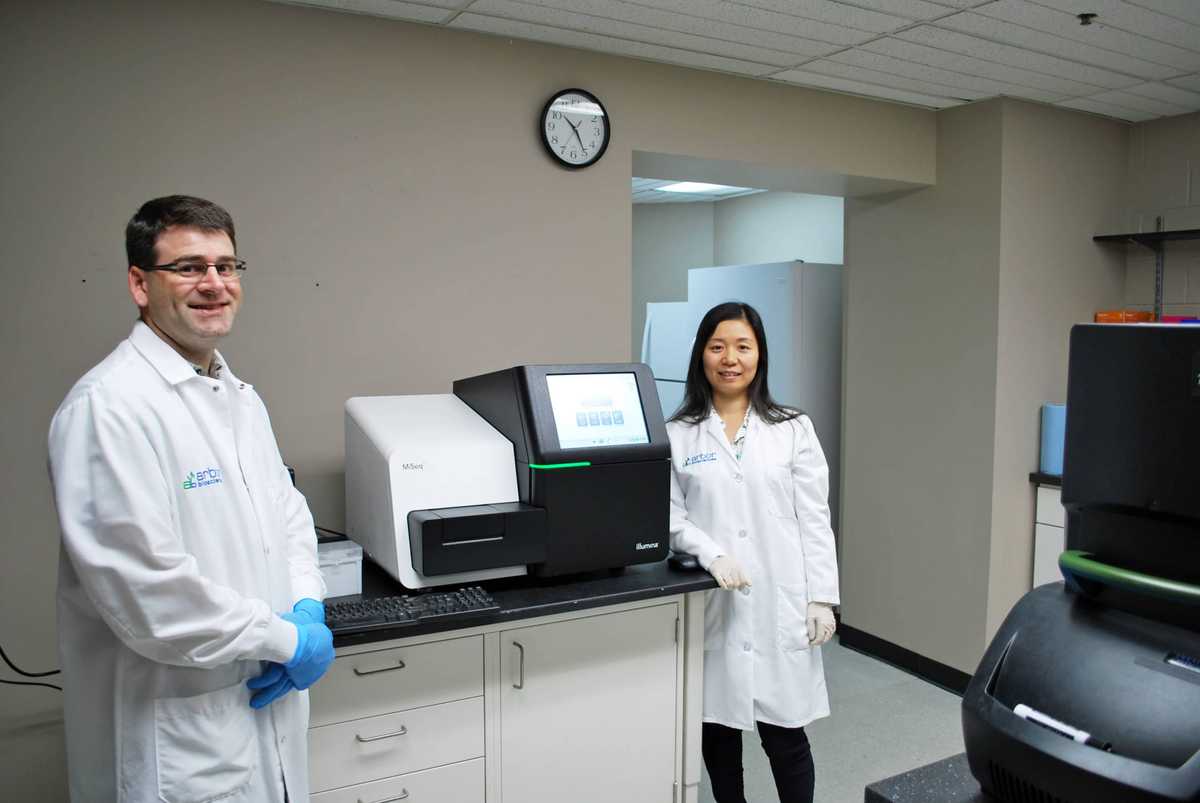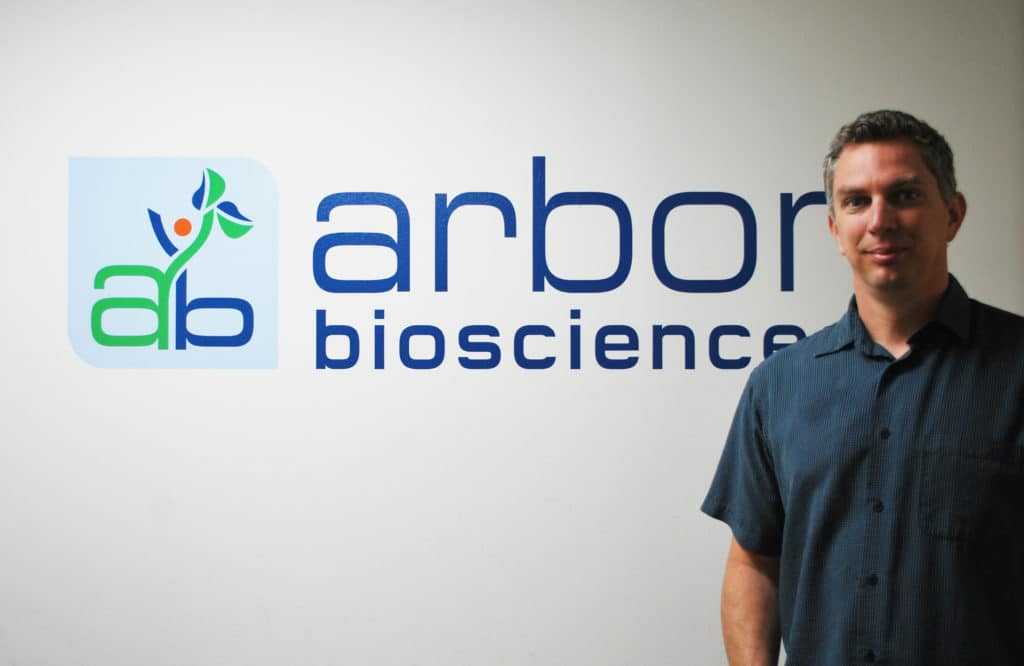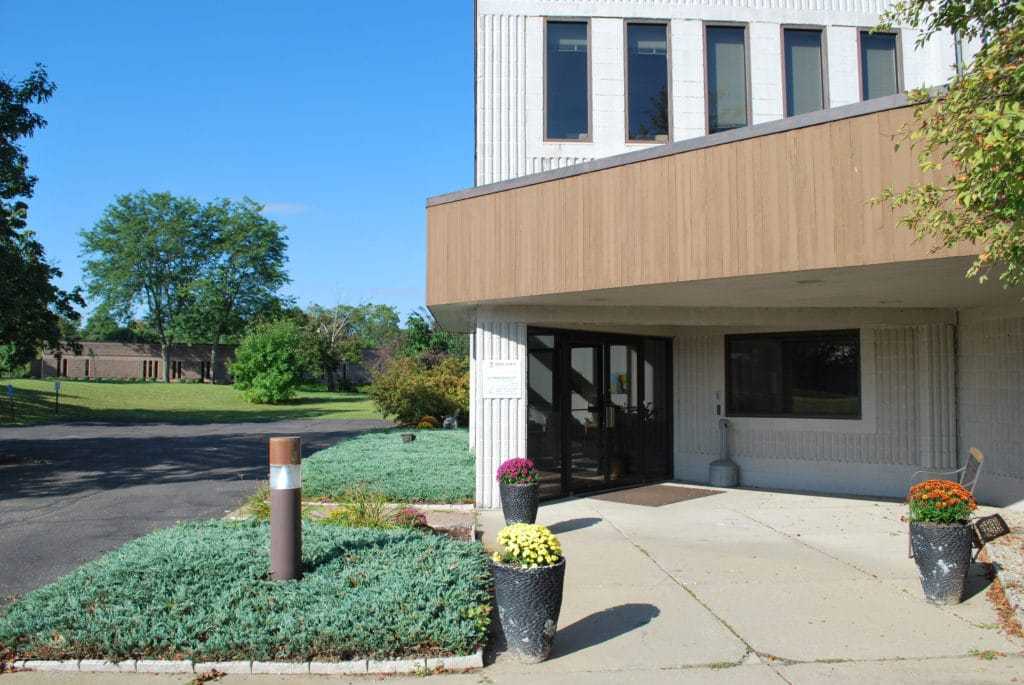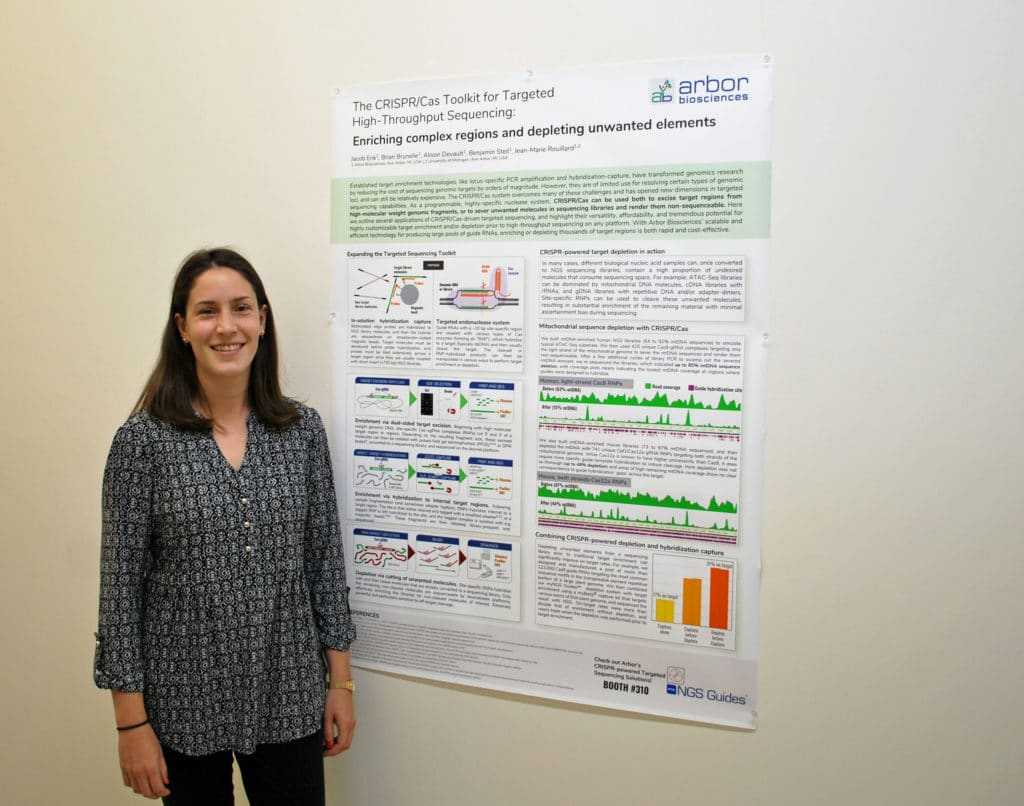Senior Research Scientist Ben Steil and Senior Applications Scientist Tyanying Lan stand next to an Arbor Biosciences Illumina DNA sequencer where they do their work.
When we were kids, it was headline news that the human genome had finally been sequenced, a remarkable feat of science that cost $2.7 billion and took 15 years to complete. Today, according to Matthew Hymes, Marketing Director of Arbor Biosciences, it's possible to replicate the same work for under $1,000, which has allowed an entire field of genomic sequencing to emerge, with applications from crop disease resistance studies to research on ancient DNA from archeological digs, to medical research. Arbor Biosciences is one of those companies, whose work in genomic sequencing can be applied to a host of industries.
What does this look like in real life? Hymes says that Arbor Biosciences works with clients to create custom genomic sequencing that targets their area of interest. So, if a company is studying ancient DNA, such as degraded neanderthal DNA, or studying speciation from museum samples where they might want to look at DNA samples from older animals like dogs, rats, or insects, "they can understand it from an evolutionary standpoint where there is differentiation" in the DNA, Hymes explains. In agrogenomics, another field of application for genomic sequencing, scientists want to study what about plant genomes makes certain crops disease or drought resistant. Arbor Biosciences allows these researchers to hone in on specific areas of a genome to do more focused work.
Matthew Hymes, Marketing Director for Arbor Biosciences, poses for a photo before taking us back to a part of the company lab space.
"What you do is synthesize the DNA, convert it to RNA, and hybridize to genomes of interest," Hymes tells us about Arbor Biosciences' involvement in this process, "then you capture the genes of interest through the complementary interaction" to study. This means scientists can focus on specific genes they want to learn more about rather than sequencing entire genomes which can be large and complex. This kind of targeted sequencing is like a specific pull request at a library: customers ask to focus on one area like a gene that influences disease resistance in crops, and can skip the extraneous sequencing and data analysis, which greatly reduces the cost of the work. Also, most companies focus on the human genome. "We mainly focus on everything but humans," Hymes says. Indeed the company's website boasts so many case studies and applications for their work it can be a little hard to grasp at first just what they do. Cell-free Protein Expression, Paleogenetics, Agrigenomics, and more.
It's not just about the sequencing either. Hymes says that the second side of Arbor Biosciences' business is in the growing field of synthetic biology, in which biological systems are used to do classically biotechnological processes, to create new products or systems that diagnose a disease or produce a drug or biofuel. Many large companies are heavily investing in this space, from BASF to DOW Chemical to Proctor and Gamble, according to Hymes.
Like many life science and biomedical companies in Ann Arbor, Arbor Biosciences is just getting set up in an understated space on the city's west side where lab space is more readily available without high downtown rents. The company is expanding quickly and only half moved in to the new offices.
"We started in 2006 in microarrays, a hot tech at the time," Hymes explains when we ask how this myriad of genomics-related services got started. "This was pre-next generation sequencing. "We synthesized DNA on a slide. Then converted to targeted sequencing to keep pace with the adoption of NGS.” The company is non-traditional in that it was self-funded along with some SPIR grants to do the initial work to set up the company. Arbor Biosciences got a big MEDC grant and loan, but took no VC money, which Hymes says keeps them nimble so they can go after new opportunities in the market. This seems like a good thing in this case, because the industry is changing so rapidly. In January of 2019, the company was acquired by U.S.-based Chiral Technologies, a company in the pharmaceuticals space, which is owned by Japanese corporation Daicel, a parent company whose nitrocellulose products used in airbag incendiary devices are now diversifying into applications in the life sciences industry.
How is all this data processed? Hymes says Arbor Biosciences uses machine learning and AI to process the data for their clients. This kind of research produces massive data sets, and that requires a lot of careful work programming in the right standards for analyzing it all. Arbor Biosciences works with a local company in machine learning that Hymes says quickly discovered there was more money to be made in this industry than in automotive. But, as in any application of machine learning, it's important to catch blind spots up front so the analysis won't be biased. It's complicated work. The recent acquisition has given the company more resources and confidence they can do the work well.
Alison Devault, Arbor Biosciences' Director of Genomics, stands next to a company poster outside the private lab space, a portion of which we couldn't enter because of privacy reasons and to avoid contaminating the lab.
"The acquisition helped accelerate our growth by more than 50% in 8 months," Hymes says. "We went from 20 people to 32." And it shows. The offices are neat, but largely undecorated. Lab space is the priority over completed offices. Scientists joke with each other as we take photos, and we quickly discover they have to borrow lab coats because they're half new hires without their own dedicated coats yet. It takes time to have them monogrammed.
"We've recruited people from the East Coast," Hymes says of the new hires, "because there are more opportunities locally and more people coming to town." The scientists have moved here from Carnegie Melon, Buffalo, South Carolina, and half from other locations around Michigan. It seems the work Arbor Biosciences is doing is just getting started, and there is massive growth potential here, though that all depends on keeping up with a shifting market in rapidly expanding fields, in genomics sequencing, synthetic biology, and in machine learning to process it all.
If you'd like to learn more about Arbor Biosciences, you can read more about targeted sequencing here, as well as genome editing. It's fascinating stuff, we hope you'll agree, and you can see the company's long list of proprietary products to see just how much growth potential there is in this space.




